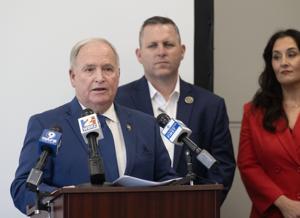From left, Sen. Rick Edmonds speaks during a press conference as St. George Mayor Dustin Yates and Rep.
Emily Chenevert look on at St. George City Hall, Thursday, March 20, 2025, in St. George, La.

Facebook Twitter WhatsApp SMS Email Print Copy article link Save Legislation to create a school district to match the new city of St. George is off to the races and has met little initial opposition. It is a notable contrast to the immediate fierce battles that similar proposals faced in 2012 and 2013, when the new district was to be called the Southeast Baton Rouge Community School System.
The city of St. George, of course, is now a reality after a bitter, yearslong incorporation effort. Supporters have returned to the Legislature to finish what they considered unfinished business from more than a decade ago with the school district.
If successful, the new St. George School System would be the fifth public school district in East Baton Rouge Parish, joining Baker, Central and Zachary in gaining educational independence from the parish school system. Its boundaries would match those of the city of St.
George. Testifying at the Legislature, St. George Mayor Dustin Yates recalled that detractors justified not giving residents of the area a school district by deriding the area as just a “collection of neighborhoods.
” “Today, we are no longer a collection of neighborhoods,” Yates said. “We are the fifth-largest city in the state of Louisiana.” Supporters say the new school district is an overdue answer to the poor quality of many Baton Rouge public schools.
Opponents argue a St. George school district would exacerbate racial segregation in the parish, reduce the quality of education for poorer children in the Baton Rouge public schools left behind and encourage more breakaway school districts in the future. Sailed through committee The two bills — Senate Bill 25 and Senate Bill 234 — that would create a St.
George school district passed without dissent and without question Wednesday through a receptive Senate Education Committee. Their passage was helped by the fact that the lead author, Sen. Rick Edmonds, R-St.
George, serves as chair of that committee. Rep. Emily Chenevert, R-Baton Rouge, is co-author.
Both bills now await action on the Senate floor. Edmonds recounted many meetings he has held with interested parties in advance of filing these bills in an effort to ease the legislation’s advance through the Legislature. “We have done everything we possibly could to get this in the proper posture that we have here today,” Edmonds said.
An example is a provision that requires an agreement between the parish school system and St. George residents for ongoing cross-district enrollment in each district’s magnet programs. Fierce opposition from families with children in magnet schools was crucial in the failure in the 2012 and 2013 legislation.
SB5, a proposed constitutional amendment to fund the new proposed district, is the bill with the toughest journey ahead. Under Louisiana law, supporters of a new school district need to win a two-thirds vote of the state Legislature to put an amendment to the state constitution on the ballot. That amendment then would need to pass with a majority vote of the entire state and the entire parish affected, in this case, East Baton Rouge.
Edmonds amended his bill to push the statewide referendum back from this November to April 18, 2026. If voters agree, the plan is to open the doors of the new St. George school district in July 2027.
EBR says little East Baton Rouge Parish leaders so far have said little publicly about the legislation. No one from the East Baton Rouge Parish school system spoke on Edwards’ bills when they came up Wednesday. Superintendent LaMont Cole said the school system is monitoring the legislation and acknowledged “there’s been a great deal of discussion and reflection happening around the potential implications of the legislation — some of which may not yet be fully understood or appreciated.
” Cole, however, said he will take his cues from the nine-member parish School Board and whatever position it ends up taking. The school system was not so cautious a decade ago. In 2012, not just one but two Baton Rouge school superintendents spoke in opposition at the initial hearing of the legislation, including Bernard Taylor, who had just been hired and was weeks away from officially starting the job.
The parish School Board soon after voted to officially oppose the legislation. One current school board member, Dadrius Lanus, did testify Wednesday, speaking for himself, saying he wanted the committee “to understand the fiscal impact of what you are getting ready to do.” He said that some 10,000-plus students could be impacted by the creation of the new district, and the parish school system would lose significant funding.
Lanus also disputed complaints about the quality of public schools in the St. George area, noting that they are among the highest performing in the district. He said the school system has worked hard to lift up those schools.
“We have done everything possible to fix a lot of the concerns and the problems,” Lanus said. BRAC "does not have a position" Absent from Wednesday’s Senate Education hearing was the Baton Rouge Area Chamber, or BRAC. On Friday, a BRAC spokeswoman said the board of directors of the business lobbying organization “does not have a position on this legislation.
” In spring 2012, BRAC came out in opposition to the legislation that year, saying it had "too many unknowns" that had the potential to "create financial disarray or lower the quality of education overall." In August 2012, BRAC and the Baton Rouge Area Foundation, or BRAF, released a report arguing that any push to carve another school district out of the East Baton Rouge school system needed to address the financial impact of the schools left behind and that those costs "cannot be left to the declining number of schools and school children that will remain in the district." 'Legacy' costs still at issue The only opposition voice from those 2012 and 2013 debates who returned Wednesday was Belinda Davis.
She is president of One Community, One School District, a group formed 13 years ago to fight the Southeast Baton Rouge breakaway school district proposal. Davis went on to serve from 2020 to 2023 on the Louisiana Board of Elementary and Secondary Education, or BESE. Davis pointed to spring break as a reason for low turnout from opponents on Wednesday, because many people were out of town.
She also noted that Edmonds placed only one of the bills, SB234, on the committee agenda late the day before, so many were not aware it was being discussed. In her testimony, Davis noted that the current St. George legislation still fails to properly address many of the financial problems identified in that 2012 BRAC/BRAF report, particularly when it comes to so-called “legacy” costs.
St. George residents have benefited from these costs, particularly when it comes to retirees, but in breaking away they would leave the parish school system to shoulder them alone. “These costs, estimated over a decade ago, ranged from approximately $40 million to $200 million depending on how they were calculated,” Davis said.
Edmonds disputed Davis, pointing to language in the bill that calls upon St. George to pay some of those legacy costs over time. Afterward, Davis said the current legislation deals only with the costs of those who retire from the parish school system and are rehired by St.
George schools, but fails to deal with the entire set of retiree legacy costs..
Environment

St. George school legislation finds little initial opposition from lawmakers

Legislation to create a school district to match the new city of St. George is off to the races and has met little initial opposition.















